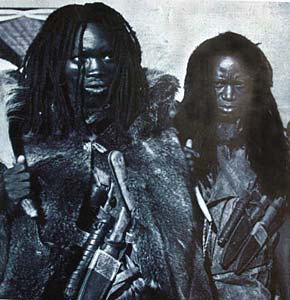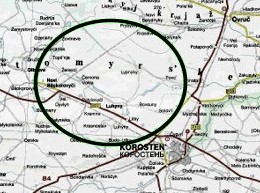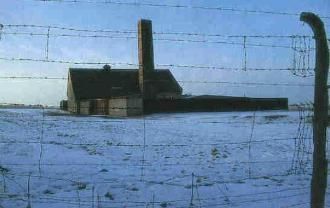 new evidence reveals the horrors of british colonial repression in studies from david anderson and caroline elkins, histories of the hanged and britain's gulag, reports
new evidence reveals the horrors of british colonial repression in studies from david anderson and caroline elkins, histories of the hanged and britain's gulag, reports ![]() reports guardian unlimited
reports guardian unlimited

we were newlyweds. we still walked around holding hands, even if we were just going to the store. i would say to him, “i love you.” but i didn’t know then how much. i had no idea . . . we lived in the dormitory of the fire station where he worked. i always knew what was happening—where he was, how he was.
one night I heard a noise. i looked out the window. he saw me. “close the window and go back to sleep. there’s a fire at the reactor. i’ll be back soon.”
the ![]() paris review
paris review ![]() publishes a text written by svetlana alexievich. this is quite a different story than elena is telling us with her
publishes a text written by svetlana alexievich. this is quite a different story than elena is telling us with her ![]() rough ride through the tschernobyl area. two ways to see the world.
rough ride through the tschernobyl area. two ways to see the world.

what to do with all these clippings, which you have been adding daily to your blogline folder? reading is one thing, blogging them is another, especially if they don´t fit directly to the main directions of your blog. why not simply comment on them in a periodical review. just for fun.
e. meint immer: ich schau noch ein wenig durch und verschwindet dann auf ewig im konsumtempel. möge es euch ähnlich damit ergehen:1. narzismus: das ewige nachdenken über die blogger szene ist zwar manchmal hilfreich, viel öfter aber nervtötend. zwischen diesen polen bewegen sich einträge von ![]() moving target [1] und [2],
moving target [1] und [2], ![]() my little tijuana und
my little tijuana und ![]() ...denn sie wissen nicht ...... reden wir doch einfach über content, mag sich da so manch eine/r ganz im
...denn sie wissen nicht ...... reden wir doch einfach über content, mag sich da so manch eine/r ganz im ![]() akademischen sinn denken. andere wiederum sind eher an der ganz konkreten realität interessiert, etwa
akademischen sinn denken. andere wiederum sind eher an der ganz konkreten realität interessiert, etwa ![]() petite anglaise oder
petite anglaise oder ![]() randgänge. sauseschritt denkt, dass immer das besonders diskutiert wird, was nicht klar ist: in diesem fall die identität der blogger. sei´s drum. die kontinuierlichen
randgänge. sauseschritt denkt, dass immer das besonders diskutiert wird, was nicht klar ist: in diesem fall die identität der blogger. sei´s drum. die kontinuierlichen ![]() wettbewerbe nerven auf jeden fall.
wettbewerbe nerven auf jeden fall.
2. geschichte: das ist geschichte, winken nur allzugerne die besonders tüchtigen und erfolgreichen ab, um sich wieder dem monetären anal-sinn zu widmen. einige fragen seien aber an dieser stelle zugelassen: wie war das damals (heute?) mit ![]() pinochet; welches entsetzliche jubiläum feiert man in
pinochet; welches entsetzliche jubiläum feiert man in ![]() tschetschenien; wer hätte
tschetschenien; wer hätte ![]() dies bei äthiopien gedacht? schließen wir mit dem stoßseufzer: oh, wie hat sich alles in deutschland ost
dies bei äthiopien gedacht? schließen wir mit dem stoßseufzer: oh, wie hat sich alles in deutschland ost ![]() ost verändert!
ost verändert!
3. über den tellerrand zu schauen mag insgesamt hilfreich sein anstatt ewig über globalisierung zu jammern: ins ![]() antlitz der roma etwa oder der
antlitz der roma etwa oder der ![]() (denkenden) passanten. vielleicht ist auch aufgefallen, dass der kreis der blogger/innen global gesehen ein recht ungleich verteilter ist: ob da ein
(denkenden) passanten. vielleicht ist auch aufgefallen, dass der kreis der blogger/innen global gesehen ein recht ungleich verteilter ist: ob da ein ![]() digitaler solidaritätsfond helfen wird?
digitaler solidaritätsfond helfen wird?
4. kurioses zu guter letzt: ![]() dog-cat content und
dog-cat content und ![]() die jugendkultur der ösis. für manche (leider) auch
die jugendkultur der ösis. für manche (leider) auch ![]() die auseinandersetzung mit claude levi-strauss oder
die auseinandersetzung mit claude levi-strauss oder ![]() immanuel kant in teheran.
immanuel kant in teheran.
das war´s dann, weg damit. für nachschub scheint gesorgt zu sein: skip it.
in the balkan region, ![]() videoletters focuses on countries that once formed Yugoslavia (FY).
after a bloody war and hundreds of thousands of victims, yugoslavia fell apart. its citizens live in five separate countries: bosnia & herzegovina, slovenia, macedonia, croatia and serbia & montenegro (including kosovo). they barely have any contacts with the 'other side'. V* tv Series consists of 20 episodes.
videoletters focuses on countries that once formed Yugoslavia (FY).
after a bloody war and hundreds of thousands of victims, yugoslavia fell apart. its citizens live in five separate countries: bosnia & herzegovina, slovenia, macedonia, croatia and serbia & montenegro (including kosovo). they barely have any contacts with the 'other side'. V* tv Series consists of 20 episodes.
in each V* episode (25') two former neighbours, friends or colleagues separated by war, exchange video letters. they express anger and sadness. they confess guilt. they put an end to rumours and gossip. when ready to accept each other's truths, they slowly re-establish their once close relationship.
after the exchange they usually meet in person for the first time since the war.
V* tv series is filmed over the last five years under complicated circumstances since many in fy regard communicating with 'the other side' as difficult, if not dangerous.
all national tv stations in fy will simultaneously broadcast videoletters in 2005 - a unique decision made by representatives of all public broadcasters during meetings in ljubljana and amsterdam.
 im rahmen des
im rahmen des  nicht an einem sonntag: es war an einem freitag abend, als wir im restaurant des hotel dubrovnik in zagreb saßen und über unsere erfahrungen mit den wilden sechzigern/siebzigern sprachen. menschen wie sauseschritt hatten die zeit in der behaglichkeit kreiskyscher reformen verbracht, andere wiederum wieder in der kälte des siechenden kommunismus polnischer oder rumänischer prägung. dementsprechend unterschiedlich war unsere perspektive hinsichtlich der individuellen aneignung des marxismus. die diskussion war, wie zu erwarten, äußerst emotional und voll von mißverständnissen. eine gute diskussion, denn wir hörten einander zu.
nicht an einem sonntag: es war an einem freitag abend, als wir im restaurant des hotel dubrovnik in zagreb saßen und über unsere erfahrungen mit den wilden sechzigern/siebzigern sprachen. menschen wie sauseschritt hatten die zeit in der behaglichkeit kreiskyscher reformen verbracht, andere wiederum wieder in der kälte des siechenden kommunismus polnischer oder rumänischer prägung. dementsprechend unterschiedlich war unsere perspektive hinsichtlich der individuellen aneignung des marxismus. die diskussion war, wie zu erwarten, äußerst emotional und voll von mißverständnissen. eine gute diskussion, denn wir hörten einander zu.dann berichtet sauseschritt von seiner gegenwärtigen lektüre:
das sei bewundernswert und verdiene unsere hochachtung, schließt sauseschritt seine kleine rede. und dann fällt der blick auf die fast erschrockene miene des kollegen aus polen: wieviel hätte wohl er zu erzählen? und könnte er dies? wie frei sprechen wir uns, die im warmen aufgewachsen sind und die revolution als interessanten zeitvertreib betrieben haben. die geschichte, das kommt und geht im gedächtnis, es ist zum verrücktwerden, meint jorge semprun.


